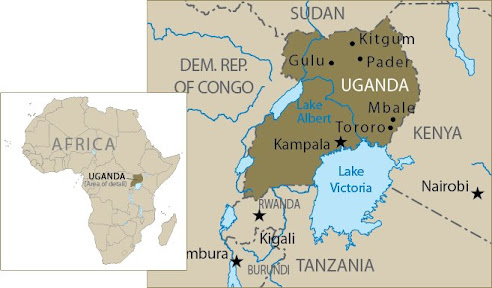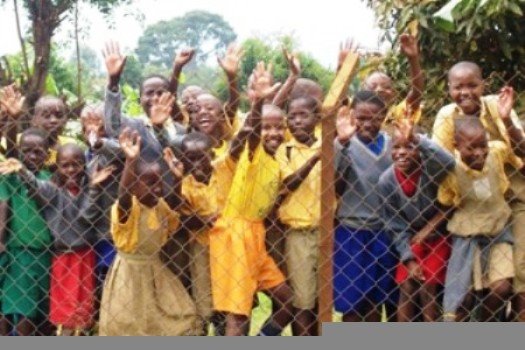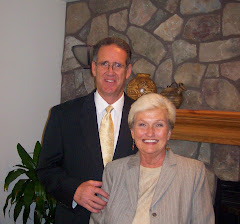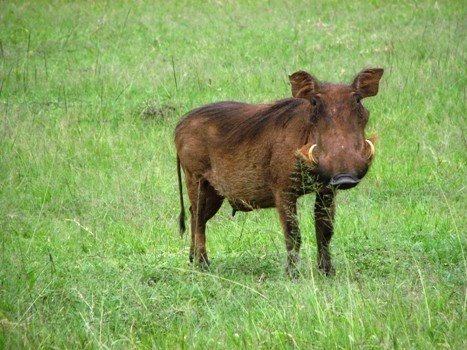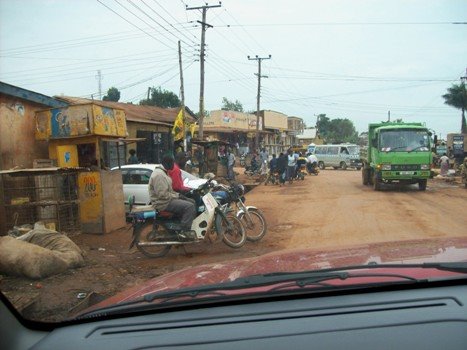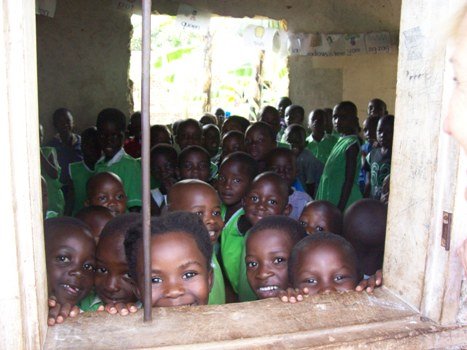
On the day wheelchairs were being distributed to recipients in Nyamlel, South Sudan an unexpected visitor arrived. Angelo Deng Bak was brought from the village of Marial Bai, some ten miles away, riding in a plastic lawn chair taped on the back of a bicycle peddled by his grandson.

He had people put him on the ground so he could bow down in the dirt in front of Ssimbwa. Angelo said that all he had in the world was 50 Sudanese Pounds (about $25) but he would give it all to us if he could buy one of the wheelchairs. When he was told he would be given a chair free of cost he wept openly.

Eleven year old Lino Tiek Dut suffered a compound fracture of the femur in his right leg three years ago. He cannot bend his leg and still has an open wound. There is not an orthopedic surgeon in all of Southern Sudan to treat him. Since his injury, he has had to either be carried or crawl on the ground by himself. He was beaming in his new whirlwind Rough Rider wheelchair as he maneuvered around the area.

Many of the people are missing limbs because of the war or as a result of landmines. The UN estimates that there are still two million landmines in Southern Sudan. Injuries from the mines are an ongoing problem

It is hard to describe the suffering and needs of the people in this part of Southern Sudan unless you see it first- hand. There are far more needs than resources but the Church is bringing hope to people who are trying to rebuild their lives after long years of war. The weather fluctuates between the rainy season which brings floods and the dry season which brings dust storms, drought and famine. Even getting supplies to remote villages like Nyamlel and Marial Bai is a major challenge. All of this is compounded by the UN sanctions against Sudan. This sometimes makes transport into Sudan difficult; we cannot work with anyone who has dealings with Khartoum in the North. Getting the wheelchairs transported from the production plant in Nairobi, Kenya to Nyamlell, Sudan was a different kind of challenge for us. Many transporters refused to take shipments into that area of Southern Sudan because of inter-tribal fighting, poor road conditions and the risks of losing the shipment, truck or both.


As an alternative, two hundred of the wheelchairs were trucked from Nairobi to Entebbe, Uganda to be flown to Nyamlell on United Nations aircraft. However, only a helicopter and small fixed wing aircraft flew from Juba, the capitol of Southern Sudan, to Aweil some thirty-five miles from Nyamlell. It was then decided that another plan had to be undertaken and the search for willing transporters began. Eventually, after several months of searching, arrangements were made to transport the two hundred wheelchairs in Entebbe to Nyamlell. At the same time, another two hundred were transported from Nairobi, Kenya to Nyamlell. When the trucks arrived in Nyamlell the springs were broken on one and both trucks lacked funds to purchase fuel for the return trip. However, the much needed wheelchairs had finally safely arrived at their intended destination. We were much relieved!

Many of the wheelchairs were fitted and distributed by Ssimbwa Busulwa, who serves as project monitor for the Church’s Humanitarian efforts in Uganda and Sudan. Nothing much would have gotten done during our time here without Ssimbwa. Other chairs were distributed in the out-lying villages of Marial Bai and Gok Macar. At the official hand-over ceremony for the wheelchair project, Angelo Deng Bak again came; this time in his new wheelchair. He said, “This chair is the greatest gift God has ever given me”.

Besides the war injuries there are many other causes of disability in Sudan. This man was suffering from Elephantitis


Some wonderful, generous private donors in California; Craig and Marilyn Faulkner, donated funds so that we could take lapboards, book bags and school supplies to the children of Nyamlell. Also the Butler 8th Ward in Salt Lake City and a Ward in Washington sent supplies to take with us. Many of the Primary cildren sent notes and letters in their packets. The excitement of the children for these items was incredible; most of them have never had supplies of their own before. They were fascinated by the small pencil sharpeners,balloons,etc. It was great fun just watching them.

Just a subtle reminder of where we are…


We are also drilling 10 deep borehole wells in Nyamlell and the surrounding villages. This will allow the people to stay in the same area without having to move with the seasons to find water. Much of the area was totally lacking in latrines so ten community latrines are being built in the villages with the boreholes.

During our earlier visit to Sudan we were in the village of Marial Bai with President Edward and Sister Erin Christensen, the Uganda Kampala Mission President. The villagers heard that the people who were bringing the wheelchairs to Sudan were there. Thinking that the wheelchairs had already arrived, they gathered in numbers under a large tree; some of them crawling there on the ground. When they found out that the wheelchairs were not yet there, many of them wept. When Sharon Eubanks, manager of major initiatives for Church Humanitarian aid worldwide heard this story she was determined to see that the project was successful.

There were many times that the project was delayed by obstacles; some seemed unsurmountable...but the wheelchairs have finally come to the people of Sudan.
